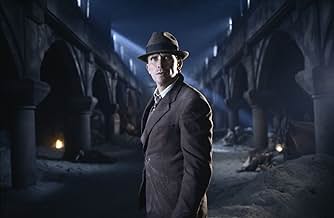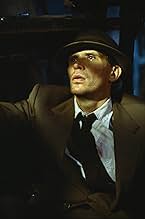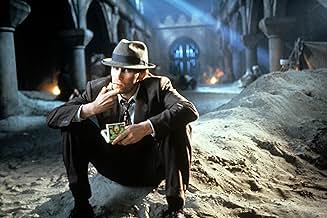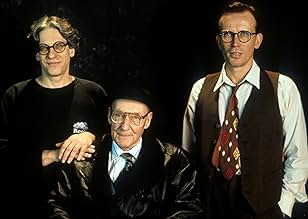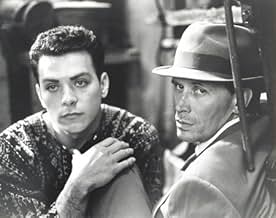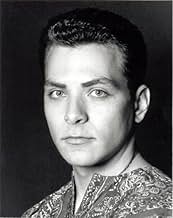Dopo aver sviluppato una dipendenza dalla sostanza che usa per uccidere gli insetti, uno sterminatore uccide accidentalmente la moglie e viene coinvolto in un complotto segreto del governo o... Leggi tuttoDopo aver sviluppato una dipendenza dalla sostanza che usa per uccidere gli insetti, uno sterminatore uccide accidentalmente la moglie e viene coinvolto in un complotto segreto del governo orchestrato da insetti giganti.Dopo aver sviluppato una dipendenza dalla sostanza che usa per uccidere gli insetti, uno sterminatore uccide accidentalmente la moglie e viene coinvolto in un complotto segreto del governo orchestrato da insetti giganti.
- Regia
- Sceneggiatura
- Star
- Premi
- 13 vittorie e 17 candidature totali
Joseph Scoren
- Kiki
- (as Joseph Scorsiani)
Louis Ferreira
- Exterminator #3
- (as Justin Louis)
Recensioni in evidenza
Lots of people will hate this film, and some will love it.
The bottom line is, if you enjoy, respect, or feel that you understand the work of William S. Burroughs, you should see this film. If you don't know what I am talking about, you should probably not see this film.
The following pedantic and potentially inflammatory review, like this film, pulls no punches and makes no apologies for itself. Read on if you dare.
_________
If any three of the following conditions apply see Naked Lunch:
YOU
1. ...know what the term "visual metaphor" means.
2. ...are a Burroughs, Kerouac or Ginsburg fan.
2a. ...are not a fan, but know and respect Burroughs, Kerouac or Ginsburg
3. ...can't see how the book Naked Lunch could make a good film.
4. ... believe that Peter Weller is an underrated actor.
5. ...thought any of the following films were 'lightweight': Lost Highway, Mulholland Drive, Twin Peaks: Fire Walk With Me, The Last Wave, Heavenly Creatures, Dead Ringers.
6. ...have lived in the New York area for 15 or more years.
7. ...know the relationship between improvisational jazz, poetry, and modern art.
8. ...think you understand what Andy Warhol was trying to do.
9. ... are curious about what the process of writing a novel is like.
10. ...spend a lot of time arguing with inanimate objects.
11. ...without knowing the content of this film, can see a potential relationship between sexual ambivalence, guilt, paranoia, addiction, typewriters and over-sized talking insects.
You should NOT see this film if any of the following apply:
YOU
1. ...consider homosexual love to be evil, wrong, and something you can not sympathize with or understand.
2. ...use the phrase "he's on drugs" to explain behavior and ideas that do not make sense to you.
3. ...do not like or respect Burroughs, Kerouac or Ginsburg, and you know who they are.
4. have a concept of challenging literature as the latest John Irving novel (no offense to Mr Irving intended - he's easily as great as Burroughs, just sort of mainstream and pop).
5. ..like films which you can walk away from easily.
6. ...don't want to see any film which requires a second viewing to feel as if you've really got any of it.
7. ...view films strictly as a form of entertainment.
8. ...without knowing the content of this film, you can not imagine a potential relationship between sexual ambivalence, guilt, paranoia, addiction, typewriters and over-sized talking insects.
9. ...don't care to understand most of the following review.
10. ...consider ambiguity and loose ends in a film to be "plot holes" and consider any film which has them to be 'flawed'.
_________________
William S. Burroughs is widely regarded as one of America's greatest writers of fiction. A friend and mentor to Jack Kerouac and Alan Ginsburg, Burroughs helped to create the genres of 'beat' - American literary high modernism, and/or post-modernism. He provides highly tactile ironic, seductively repulsive descriptions of the everyday which are at once accurate, fragmented and surreal - in other words - Burroughs recreates the feeling and mood of his time and his experience with hermeneutic precision.
Cronenberg's Naked Lunch is an amalgamation of Cronenberg's interpretation and experience of reading Burroughs, Burroughs own life, and Burrough's legendary novel, Naked Lunch. There are six or more plots operating in six or more interacting layers throughout the film, and the action centers exclusively on Burrough's alter-ego, Bill Lee, as he attempts to discover the relationships between all of these plots. The plots I identify (and an interested viewer will generally be able to identify many more that this) are Burrough's relationship with Joan, Lee's relationship with Joan, Lee's drug addiction, Burrough's drug addiction, Lee's investigations into the secret society of drug trafficking at the edge of the world in Interzone, Burrough's struggle to create/discover himself. However, the theme of the film is more an issue of the Lee/Burroughs character trying and, in the end, failing, to make sense of the connections between these plots.
It is a very self-conscious, personal, brilliantly developed and visually intense film. Yet, despite its self-exposure and openness, the film maintains a certain distance from its audience, as if it has taken on the life given it by Cronenberg and Burroughs and established its own unique personality, which will keep its audience at a certain distance. To really appreciate this, you must watch the film at least a few times.
It is especially significant that Burroughs gave his approval for this project. Burroughs' writing is intensely personal and artistic, and his willingness to allow Cronenberg to position himself and his experience of Burrough's work within the film, and to decenter Naked Lunch is as powerful a testimony to Burrough's own integrity as an artist as it is to Cronenberg's vision.
Most of the people who acted in this film really wanted to be involved in it and it shows. Ian Holm and Roy Scheider are always great. Peter Weller, a big Burroughs fan and a severely underrated actor gives what may be the performance of his lifetime, Judy Davis and Julian Sands are both perfectly cast and powerful in their roles.
This films imagery is necessarily disturbing, disorienting, and, at times, quite comic. Very much in keeping with the feel of Burrough's work.
See it. You don't have to like it to respect it.
The bottom line is, if you enjoy, respect, or feel that you understand the work of William S. Burroughs, you should see this film. If you don't know what I am talking about, you should probably not see this film.
The following pedantic and potentially inflammatory review, like this film, pulls no punches and makes no apologies for itself. Read on if you dare.
_________
If any three of the following conditions apply see Naked Lunch:
YOU
1. ...know what the term "visual metaphor" means.
2. ...are a Burroughs, Kerouac or Ginsburg fan.
2a. ...are not a fan, but know and respect Burroughs, Kerouac or Ginsburg
3. ...can't see how the book Naked Lunch could make a good film.
4. ... believe that Peter Weller is an underrated actor.
5. ...thought any of the following films were 'lightweight': Lost Highway, Mulholland Drive, Twin Peaks: Fire Walk With Me, The Last Wave, Heavenly Creatures, Dead Ringers.
6. ...have lived in the New York area for 15 or more years.
7. ...know the relationship between improvisational jazz, poetry, and modern art.
8. ...think you understand what Andy Warhol was trying to do.
9. ... are curious about what the process of writing a novel is like.
10. ...spend a lot of time arguing with inanimate objects.
11. ...without knowing the content of this film, can see a potential relationship between sexual ambivalence, guilt, paranoia, addiction, typewriters and over-sized talking insects.
You should NOT see this film if any of the following apply:
YOU
1. ...consider homosexual love to be evil, wrong, and something you can not sympathize with or understand.
2. ...use the phrase "he's on drugs" to explain behavior and ideas that do not make sense to you.
3. ...do not like or respect Burroughs, Kerouac or Ginsburg, and you know who they are.
4. have a concept of challenging literature as the latest John Irving novel (no offense to Mr Irving intended - he's easily as great as Burroughs, just sort of mainstream and pop).
5. ..like films which you can walk away from easily.
6. ...don't want to see any film which requires a second viewing to feel as if you've really got any of it.
7. ...view films strictly as a form of entertainment.
8. ...without knowing the content of this film, you can not imagine a potential relationship between sexual ambivalence, guilt, paranoia, addiction, typewriters and over-sized talking insects.
9. ...don't care to understand most of the following review.
10. ...consider ambiguity and loose ends in a film to be "plot holes" and consider any film which has them to be 'flawed'.
_________________
William S. Burroughs is widely regarded as one of America's greatest writers of fiction. A friend and mentor to Jack Kerouac and Alan Ginsburg, Burroughs helped to create the genres of 'beat' - American literary high modernism, and/or post-modernism. He provides highly tactile ironic, seductively repulsive descriptions of the everyday which are at once accurate, fragmented and surreal - in other words - Burroughs recreates the feeling and mood of his time and his experience with hermeneutic precision.
Cronenberg's Naked Lunch is an amalgamation of Cronenberg's interpretation and experience of reading Burroughs, Burroughs own life, and Burrough's legendary novel, Naked Lunch. There are six or more plots operating in six or more interacting layers throughout the film, and the action centers exclusively on Burrough's alter-ego, Bill Lee, as he attempts to discover the relationships between all of these plots. The plots I identify (and an interested viewer will generally be able to identify many more that this) are Burrough's relationship with Joan, Lee's relationship with Joan, Lee's drug addiction, Burrough's drug addiction, Lee's investigations into the secret society of drug trafficking at the edge of the world in Interzone, Burrough's struggle to create/discover himself. However, the theme of the film is more an issue of the Lee/Burroughs character trying and, in the end, failing, to make sense of the connections between these plots.
It is a very self-conscious, personal, brilliantly developed and visually intense film. Yet, despite its self-exposure and openness, the film maintains a certain distance from its audience, as if it has taken on the life given it by Cronenberg and Burroughs and established its own unique personality, which will keep its audience at a certain distance. To really appreciate this, you must watch the film at least a few times.
It is especially significant that Burroughs gave his approval for this project. Burroughs' writing is intensely personal and artistic, and his willingness to allow Cronenberg to position himself and his experience of Burrough's work within the film, and to decenter Naked Lunch is as powerful a testimony to Burrough's own integrity as an artist as it is to Cronenberg's vision.
Most of the people who acted in this film really wanted to be involved in it and it shows. Ian Holm and Roy Scheider are always great. Peter Weller, a big Burroughs fan and a severely underrated actor gives what may be the performance of his lifetime, Judy Davis and Julian Sands are both perfectly cast and powerful in their roles.
This films imagery is necessarily disturbing, disorienting, and, at times, quite comic. Very much in keeping with the feel of Burrough's work.
See it. You don't have to like it to respect it.
God, I like Cronenberg. I like his commitment. I like his designs. I like the fact that he deals straight and heavy.
I even like the feel of this movie while at the same time noting that it fails, at least it fails if you consider the value of the book.
The book is one of many that deals with the sliding overlap between one reality and another. I welcome any of these. And this is particularly attractive because of the animate typewriters-become-agent-controllers. These are much more visceral in the film. But the book made much of the scintillating overlap, the typed page that touched the earth from time to time that we would literally hold in our hands to assure us that there was a reality.
Cronenberg has none of this. As with all his films, there is one world, and he invests heavily in making it real. So we see ourselves, the typewriter that takes control, that provides the trance, the words, the enticement toward perversion of several types and its means. Cronenberg's slip into alternative universes is slippery only one way; he won't let us come home. I admire this, because I would rather see passion invested by an artist than compromise for something as trivial as effect. But here, I do miss the effect.
Judy Davis is her usual sublime self. The character (actually two, sortof) is a mess and is never anchored. But she herself is, outside the film. Her character's role is crucial to the thing, a sort of fulcrum around which the real and hallucinogenic revolve. Sex, meaning, holding onto the world. She accomplishes this not through the character, but the solid soul of the actress which shines through. Who else can do this? No one I know.
Ted's Evaluation -- 3 of 3: Worth watching.
I even like the feel of this movie while at the same time noting that it fails, at least it fails if you consider the value of the book.
The book is one of many that deals with the sliding overlap between one reality and another. I welcome any of these. And this is particularly attractive because of the animate typewriters-become-agent-controllers. These are much more visceral in the film. But the book made much of the scintillating overlap, the typed page that touched the earth from time to time that we would literally hold in our hands to assure us that there was a reality.
Cronenberg has none of this. As with all his films, there is one world, and he invests heavily in making it real. So we see ourselves, the typewriter that takes control, that provides the trance, the words, the enticement toward perversion of several types and its means. Cronenberg's slip into alternative universes is slippery only one way; he won't let us come home. I admire this, because I would rather see passion invested by an artist than compromise for something as trivial as effect. But here, I do miss the effect.
Judy Davis is her usual sublime self. The character (actually two, sortof) is a mess and is never anchored. But she herself is, outside the film. Her character's role is crucial to the thing, a sort of fulcrum around which the real and hallucinogenic revolve. Sex, meaning, holding onto the world. She accomplishes this not through the character, but the solid soul of the actress which shines through. Who else can do this? No one I know.
Ted's Evaluation -- 3 of 3: Worth watching.
Mmmmm.... mugwump jizz
Themes: Substance addiction and how physically self-conscious it makes our protagonist feel, the creativity forced by imprisonment (a direct reference to real-life events between Burroughs, his wife, his subsequent incarceration and his heroin/acid issues), the sense of betrayal as more surprise than malice and of course the inevitable interface between Dave and Bill at the pelvic level.
The effects work is pre render-mation latex and sufficiently restrained to allow your imagination to back-fill the appropriate horror/fascination/titillation for the moment. Don't try to figure out which you =should= feel or to mentally sort it out, that'd rob you of the fun; it's the psychic and emotional disarray that makes it so compelling.
Peter Weller is suitably deadpan, allowing only a sparkle of the playful poet to shine through from time to time (the story about the Duke du Vantra's Espano-Suiza made me howl); he must have spent a few =fun= hours with Burroughs himself to get the role down.
If you liked Cronenburg's smarter stuff, such as Dead Ringers, you'll love this. If you've read Kerouac, Ginsberg or Burroughs in particular, I promise you'll love it. If you're not into exploratory literature, have issues with distasteful realities of poverty or have a personal affection for the quality works of Stallone, Willis and Schwarzenegger - you'll hate it.
It made a very strong impression on me; the day after I saw the opening night of Naked Lunch (long before the "internet"), I established and sysoped a BBS that was the primary alternative discussion forum for onliners in Edmonton, Alberta for several years. It's name? The Interzone.
The movie is fascinating, odd, reveals more on second viewing, and is faithful neither to Cronenburg nor Burroughs but an excellent mix of elements of both.
It has a great beat, easy to dance to... I give it an 89, Dick.
Either way, you won't look at a typewriter the same way ever again.
Themes: Substance addiction and how physically self-conscious it makes our protagonist feel, the creativity forced by imprisonment (a direct reference to real-life events between Burroughs, his wife, his subsequent incarceration and his heroin/acid issues), the sense of betrayal as more surprise than malice and of course the inevitable interface between Dave and Bill at the pelvic level.
The effects work is pre render-mation latex and sufficiently restrained to allow your imagination to back-fill the appropriate horror/fascination/titillation for the moment. Don't try to figure out which you =should= feel or to mentally sort it out, that'd rob you of the fun; it's the psychic and emotional disarray that makes it so compelling.
Peter Weller is suitably deadpan, allowing only a sparkle of the playful poet to shine through from time to time (the story about the Duke du Vantra's Espano-Suiza made me howl); he must have spent a few =fun= hours with Burroughs himself to get the role down.
If you liked Cronenburg's smarter stuff, such as Dead Ringers, you'll love this. If you've read Kerouac, Ginsberg or Burroughs in particular, I promise you'll love it. If you're not into exploratory literature, have issues with distasteful realities of poverty or have a personal affection for the quality works of Stallone, Willis and Schwarzenegger - you'll hate it.
It made a very strong impression on me; the day after I saw the opening night of Naked Lunch (long before the "internet"), I established and sysoped a BBS that was the primary alternative discussion forum for onliners in Edmonton, Alberta for several years. It's name? The Interzone.
The movie is fascinating, odd, reveals more on second viewing, and is faithful neither to Cronenburg nor Burroughs but an excellent mix of elements of both.
It has a great beat, easy to dance to... I give it an 89, Dick.
Either way, you won't look at a typewriter the same way ever again.
Naked Lunch seems to be just totally incomprehensible upon first viewing. However, after watching it again, you start to understand more and more. Upon multiple viewings, you really get a feel for what's transpiring before your eyes. The ultimate message is that it is really just a metaphor for heroin addiction, even though it's so much more deeper than that. It's an intricate study of a man, William S. Burroughs, who was a heroin addict, and among other things one of the most significant Beat authors ever. The film delves deeply into the psyche of Burroughs and takes you on a trip in his mind and your own. There are touches of reality and many flashes of paranoia, and it is all done with style and grace. Seriously one of the best films about an author, Naked Lunch will certainly stand the test of time against other films which may seem at first entertaining, but lose their luster upon multiple viewings. Whereas, Naked Lunch, in my opinion, never will. 10 out of 10.
Movies in the last years have become more uniform, more streamlined, particularly in the US. As a result, the film market is full of sleek, entertaining movies that the whole world goes to see, but these movies have nothing but harmless baby teeth. Fortunately, people like Lynch or Cronenberg still do movies that may be considered defective by most people, but that bite into the flesh with pointy canines. The Naked Lunch has very sharp teeth indeed. It's supposed to be an adaptation from a William Burrough's book, which doesn't make sense anyway. It starts as the story of a failed writer whose wife becomes addicted to an insecticide powder... It goes downhill after this relatively sane and normal beginning. It's a ride, a drug-induced nightmare full of horribly funny visions (the sort of visions that artists used centuries ago to represent hell). Anuses talk. Aliens sip alcohol in bars. People get impaled. Typewriters turn into bugs. Liquids ooze. You may say it's flawed, or disgusting, or ridiculous, or boring. I saw it with someone who absolutely hated it. But the fact that this person still keeps talking about it 8 years after seeing it says a lot about the Naked Lunch, at a time when we tend to forget blockbusters a few hours after watching them. The Naked Lunch is here - in your mind - to stay.
Lo sapevi?
- QuizPeter Weller turned down the lead role in RoboCop 3 (1993) to appear in this movie.
- BlooperThe glass shot off Judy Davis' head changes to a plastic glass. First instance as the glass is falling off her head after the shot and then at end of film it is a plastic glass Ms Davis balances on her head. It remains plastic until it falls to floor and changes back into glass.
- Colonne sonoreVaya Con Dios
Composed by Larry Russell / Inez James / Buddy Pepper
Performed by Les Paul and Mary Ford
Courtesy of Capitol Records
I più visti
Accedi per valutare e creare un elenco di titoli salvati per ottenere consigli personalizzati
- How long is Naked Lunch?Powered by Alexa
Dettagli
- Data di uscita
- Paesi di origine
- Lingue
- Celebre anche come
- El almuerzo desnudo
- Luoghi delle riprese
- Toronto, Ontario, Canada(Studio, only interiors)
- Aziende produttrici
- Vedi altri crediti dell’azienda su IMDbPro
Botteghino
- Budget
- 16.000.000 USD (previsto)
- Lordo Stati Uniti e Canada
- 2.641.357 USD
- Fine settimana di apertura Stati Uniti e Canada
- 64.491 USD
- 29 dic 1991
- Lordo in tutto il mondo
- 2.665.810 USD
- Tempo di esecuzione1 ora 55 minuti
- Colore
- Mix di suoni
- Proporzioni
- 1.85 : 1
Contribuisci a questa pagina
Suggerisci una modifica o aggiungi i contenuti mancanti

Divario superiore
By what name was Il pasto nudo (1991) officially released in India in Hindi?
Rispondi

